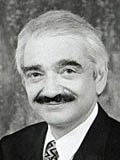Howard Frank

Howard Frank earned his Ph.D. in Electrical Engineering from Northwestern University in 1965. His thesis was built on “statistical communication type theory, sort of an extension of Von Neumann work.” He then accepted an appointment as assistant professor in electrical engineering and computer science at the University of California, Berkeley. Where he expected to make a “career.” At Berkeley he came across an article in the Journal of Mathematical Biophysics that allowed him to reproduce the thousands of hours of computer simulation done by Paul Baran on a single page of formulas. The article, “Vulnerability of Communication Networks,” was published in the IEEE Transactions on Communication Technology in December 1967. It attracted immediate attention and Frank was invited to give a talk at the Institute for Defense Analysis in Washington. That led to his joining the Office of Emergency Preparedness (OEP) in 1968 and undertaking a project for the Federal Power Commission that Frank describes as “essentially the beginnings of all the topological design of computing networks.” After a very successful eleven months with the OEP, Frank left to help launch a start-up: Network Analysis Corporation (NAC). He soon renewed his relationship with Larry Roberts who was struggling, in his spare time, to optimize the telephone connections between the first four nodes of Arpanet and expansion to sites on the East Coast. It was a problem ideally suited for the skills Frank had mastered. A first small contract let in October 1969 led to a “crash effort” and successful deliverables in February 1970. Frank would then join his friend Leonard Kleinrock in supporting Roberts, and then Robert Kahn, in architecting the build-out of the future Arpanet. He also served on the packet-radio working group. But serving as the principal investigator for the ARPA contract through 1977 was only a part of Frank’s career. In 1970, Frank assumed the leadership of NAC, then sold NAC to Contel Corporation in July 1980, He left Contel in April 1985, formed a new systems integration company focused on network management in February 1986: Network Management Incorporated,. To complete his journey as of 1988, Frank joined the Board of Directors of Contel April 1986.
I interviewed Dr. Frank to understand how he came to be one of the central consultants to the early history of the IPTO office and the Arpanet. By the end of our few hours together, I had learned more than I had ever imagined about the early history of computer communications. This interview is one of the essential reads for anyone interested in this history. Frank gave generously of his time and insights and informed my writings. It is no wonder that his achievements were not over as of May 1988. Frank personifies the technological entrepreneur and executive.
Keywords: UC Berkeley, IPTO, Arpanet, Office of Emergency Preparedness (OEP), Network Analysis Corporation (NAC), Contel